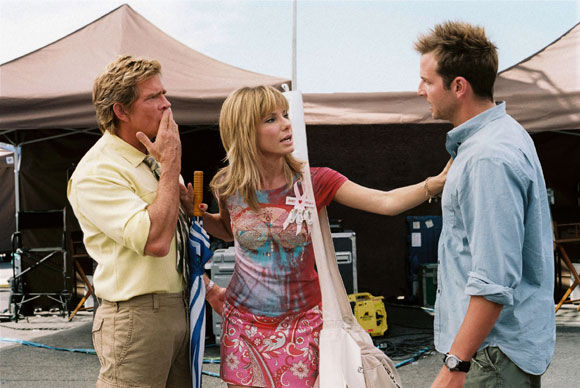All About Steve

A pretzel. That’s the first thing entering my mind when I attempt to describe this film. Mary Magdalene Horowitz (Sandra Bullock), thusly named in the event we ignore all the dialogue and character stereotypes which point to her Catholic-Jewish heritage, creates crossword puzzles for the Sacramento Herald. She is a “cruciverbalist,” which almost sounds like someone who nails people to a cross for talking too much… but no.
The film begins with the obligatory establishing shot of our protagonist walking through city streets, parks, and the like on her way to work. Outside Manhattan, who walks to work? All right. Fine. The director’s trying to browbeat us into accepting the character’s ludicrous eccentricities, which include imitating the mannerisms, if not the mutteringly self-aware dialogue, of Michael Cera’s typecast roles. Her parents (played by Howard Hesseman and Beth Grant) are emotional props, receiving Mary’s nest-dwelling dependency with trepidation—a contrivance set up to contrast with distress, relief and ultimately admiration.
So annoying is Mary, her parents arrange a blind date with Steve (Bradley Cooper, a Ralph Fiennes for the impoverished). Certainly Mary believes that Steve will be a frumpy, strange bird not unlike… herself? We’ll revisit the film’s bankruptcy of ideas later, but suffice it to say that Steve is “normal.” Naturally, clothes fly as quickly do the words from her mouth. Suddenly, the loquacious yet bodacious Mary becomes human repellant, as Steve jostles his phone and finds a way out of this bizarre engagement. As intelligent as she must be to have such a large vocabulary, Mary’s aptitude for reading body language remains abhorrent. The filmmakers seem to conflate the difference between abnormality and ineptitude. Many youth are socially awkward, and yet at less than half Mary’s age instantly recognize repudiation.
The movie title comes from the crossword that gets Mary fired, featuring intricate details about Steve, whom she is determined to follow across country as he and his producer Angus (Ken Cheong typecast as the Asian-American with the un-Asian name) and field reporter Hartman (Thomas Haden Church). After boring a busload of passengers to near death, she’s ditched at the Halfway House Cafe, where she hitches a ride with Norm (M.C. Gainey), a trucker. He manages to keep her quiet enough, and she departs, “Thanks for not raping me.” When he replies, “My pleasure,” there’s a second layer of meaning but a thought that’s never really quite finished. Moments like this are merely speed bumps along a plot hurtling mercilessly toward a finish line you neither see coming, nor would you want to. (hint: Were you thinking “deaf kids”, “sinkhole”? No? I defy you to write a dumber screenplay.)
Betwixt inexplicable gay jokes and fireman jokes, Mary manages to befriend a couple of like-minded strangers, Howard (D.J. Qualls playing a gawky nerd, imagine that) and Elizabeth (Katy Mixon, channeling Zelda Rubinstein’s voice), protesting the removal of a baby’s third leg on one of Steve’s stops. Here’s where the intellectual bankruptcy of the production rears its head. It’s evident, except to anyone in the movie, that Howard and Mary are a perfect match. Instead of developing his character, he’s literally a plot vehicle, driving them from city to city to play catch-up with the unworthy Steve. The misfits in this story all conform to a fashion-comatose stereotype while the “normal” leads are all relatively good-looking, well-coiffed people. It’s what’s on the outside that counts, or at least condescends to the audience who the filmmakers must believe cannot penetrate even a single, wafer-thin slice of subtext.
First-time feature director Phil Traill (formerly a television director), writer Kim Barker (previous credit: License to Wed), and editors Rod Dean and Virginia Katz, seem to have slapped together the scenes, with angles that don’t correspond between cuts and pauses that run several beats too long—resting for laughs but yielding tepid groans. Tim Suhrsted, the cinematographer with numerous films to his credit, can’t seem to keep the camera still. Like Steve, he defies using a tripod where handheld shots are unnecessary. What results is a film that is incomprehensible and unnerving to watch, for its shoddy characterizations, muddling plot and visual incomprehensibility. That said, the second half picks up the pace, proffering more action—things taking place, not necessarily in any believable or purposeful manner—if nothing to actively contemplate.
 All About Steve • Dolby® Digital surround sound in select theatres • Aspect Ratio: 2.39:1 • Running Time: 98 Minutes • MPAA Rating: PG-13 for sexual content including innuendos. • Distributed by Twentieth Century-Fox Film Corp.
All About Steve • Dolby® Digital surround sound in select theatres • Aspect Ratio: 2.39:1 • Running Time: 98 Minutes • MPAA Rating: PG-13 for sexual content including innuendos. • Distributed by Twentieth Century-Fox Film Corp.